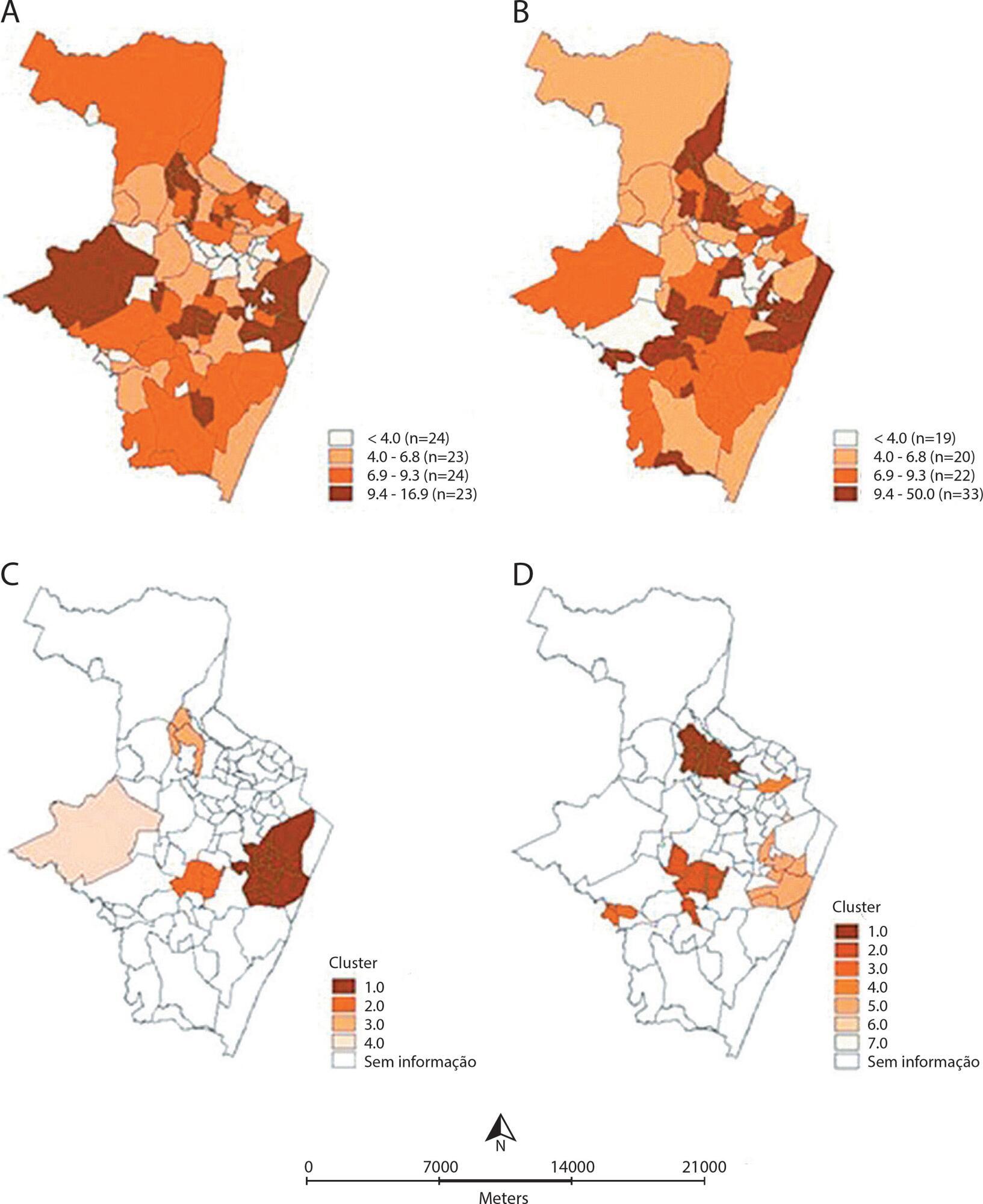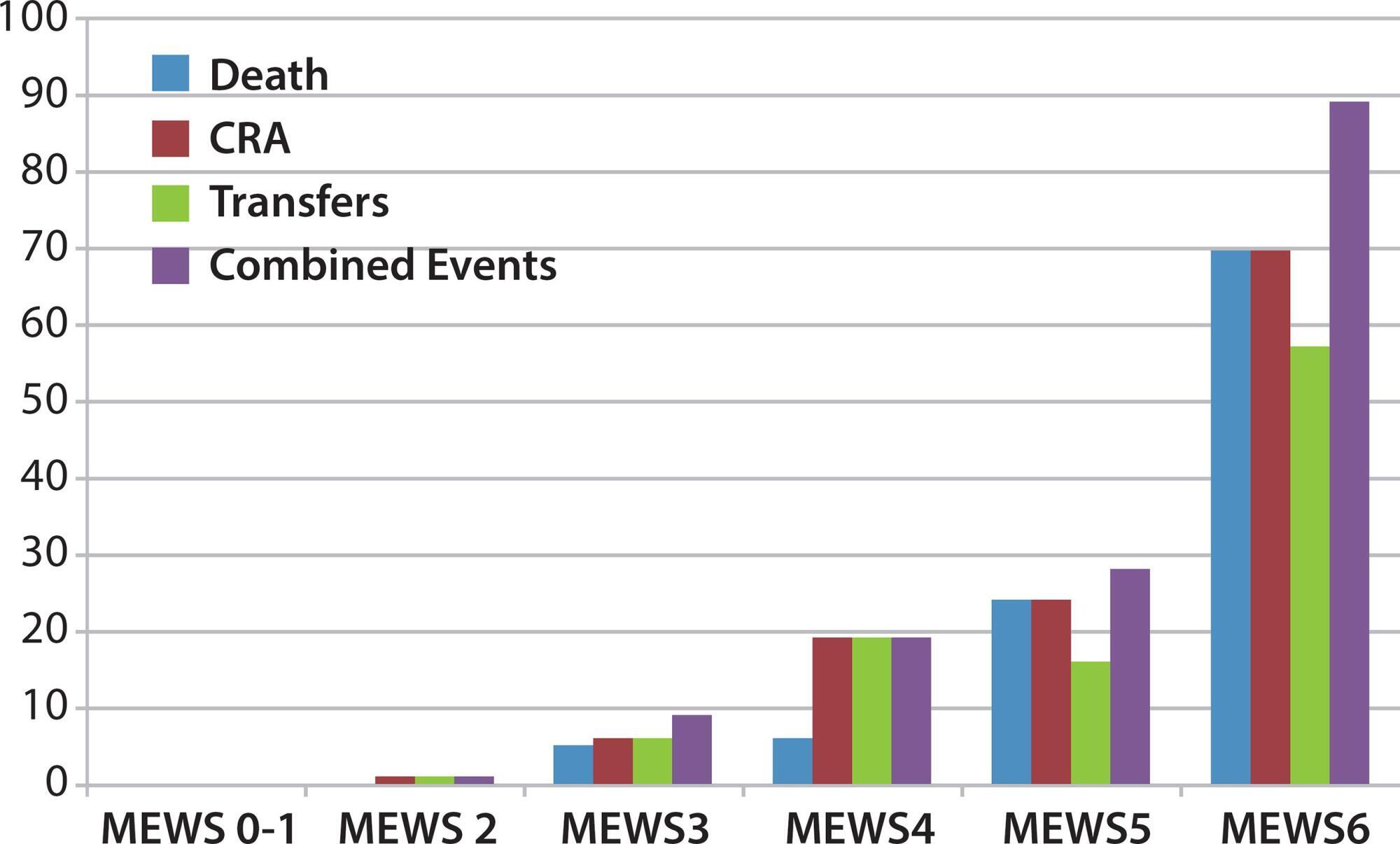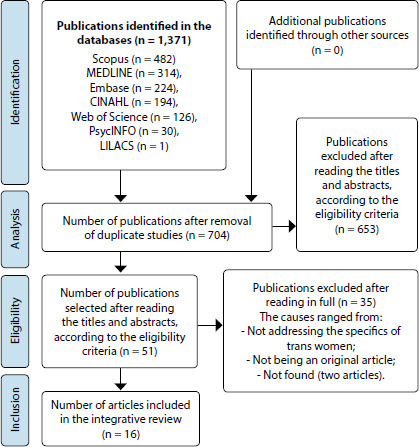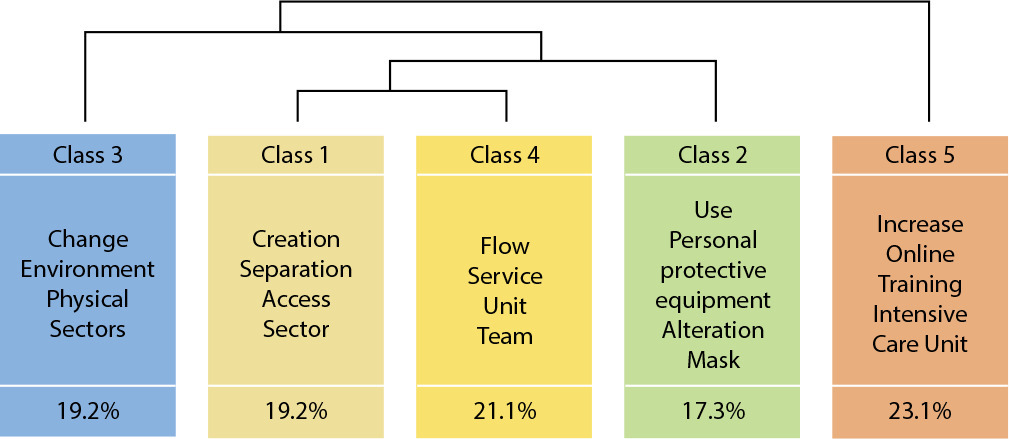-
RESEARCH01-01-2017
Mental health in the Family Health Strategy as perceived by health professionals
Revista Brasileira de Enfermagem. 2017;70(5):935-941
Abstract
RESEARCHMental health in the Family Health Strategy as perceived by health professionals
Revista Brasileira de Enfermagem. 2017;70(5):935-941
DOI 10.1590/0034-7167-2016-0492
Views0See moreABSTRACT
Objective:
to analyze the management of mental health needs in primary care as perceived by Family Health Strategy professionals.
Method:
this was a qualitative descriptive exploratory study developed within the coverage area of five family health teams. The data were collected using observation, group interviews, individual semi-structured interviews, and focus groups. Content analysis was conducted using text analysis software and interpretation was based on the corresponding analytical structures.
Results:
numerous and challenging mental health demands occur in this setting, for which the teams identified care resources; however, they also indicated difficulties, especially related to the operationalization and integration of such resources.
Conclusion:
there is a need for a care network sensitive to mental health demands that are better coordinated and more effectively managed.

-
RESEARCH01-01-2017
Nursing care by telehealth: what is the influence of distance on communication?
Revista Brasileira de Enfermagem. 2017;70(5):928-934
Abstract
RESEARCHNursing care by telehealth: what is the influence of distance on communication?
Revista Brasileira de Enfermagem. 2017;70(5):928-934
DOI 10.1590/0034-7167-2016-0142
Views0See moreABSTRACT
Objective:
Evaluate the perception of nurses regarding interpersonal communication while providing care via telehealth.
Method:
Qualitative research realized with seven nurses working in telehealth in Brazil, the sample was determined by data saturation. A questionnaire with open questions was applied and then content analysis of the dialogues was conducted, focusing on thematic analysis.
Results:
Four categories emerged from the dialogues: Understanding the importance of communication; the interpersonal relationship interfering with communication; Communicating via technology; and Learning the communication process.
Final considerations:
The perception of nurses working in telehealth in Brazil is that technology has facilitated their professional practice; however, in relation to the communication process, they believe it is harder to communicate by telehealth, mainly due to difficulty in perceiving nonverbal signals. To overcome these difficulties, they agreed that interpersonal communication is a skill that must be acquired during their professional training.
-
RESEARCH01-01-2017
Experiences in the Family Health Strategy: demands and vulnerabilities in the territory
Revista Brasileira de Enfermagem. 2017;70(5):920-927
Abstract
RESEARCHExperiences in the Family Health Strategy: demands and vulnerabilities in the territory
Revista Brasileira de Enfermagem. 2017;70(5):920-927
DOI 10.1590/0034-7167-2015-0033
Views0See moreABSTRACT
Objective:
To understand the daily demands of Family Health Strategy in clinical practice of the team and social vulnerabilities of community territory.
Method:
Research with qualitative approach, in a critical-reflexive perspective, held with two teams of the Family Health Strategy, in the city of Fortaleza, State of Ceará, Brazil. The participants were 22 users and 19 health professionals from the basic health network. Data from the interviews and observation were analyzed under the assumptions of critical hermeneutics.
Results:
We highlight the unveiling of sufferings and daily clashes, the influence of social determinants on health and psychosocial demands, limits and possibilities of everyday clinical practice.
Conclusion:
The clinic attention must recognize the perceptions and living conditions by listening and promoting health in the community.
-
RESEARCH01-01-2017
Neoliberalist influences on nursing hospital work process and organization
Revista Brasileira de Enfermagem. 2017;70(5):912-919
Abstract
RESEARCHNeoliberalist influences on nursing hospital work process and organization
Revista Brasileira de Enfermagem. 2017;70(5):912-919
DOI 10.1590/0034-7167-2016-0092
Views0See moreABSTRACT
Objectives:
To describe and analyze the influence of the neoliberal economic and political model on the nursing hospital work process and organization.
Method:
Qualitative descriptive research, having as its scenery a university hospital. The subjects were 34 nursing workers. The data collection took place from March to July 2013, through semi-structured interview. The data treatment technique used was content analysis, which brought up the following category: working conditions precariousness and its consequences to the hospital work process and organization in the neoliberal context.
Results:
The consequences of neoliberalism on hospital work process and organization were highlighted, being observed physical structure, human resources and material inadequacies that harms the assistance quality. In addition to wage decrease that cause the need of second jobs and work overload.
Final considerations:
There is a significant influence of the neoliberal model on hospital work, resulting on working conditions precariousness.
-
RESEARCH01-01-2017
Nursing team’s conceptions about the families of hospitalized children
Revista Brasileira de Enfermagem. 2017;70(5):904-911
Abstract
RESEARCHNursing team’s conceptions about the families of hospitalized children
Revista Brasileira de Enfermagem. 2017;70(5):904-911
DOI 10.1590/0034-7167-2016-0233
Views0See moreABSTRACT
Objectives:
to describe nursing team care and discuss the nursing team’s conception of companion families of hospitalized children. The study was based on the theoretical framework of Collière’s theory of nursing care identity.
Method:
this was a qualitative study with 14 members of a nursing team, conducted through an unstructured group interview. Thematic data analysis was employed.
Results:
habitual and repair care was delegated to families, regardless of the child’s clinical condition.
Final considerations:
the team’s official discourse about the families of hospitalized children, as recommended by the literature, refers to the family’s alterity and participation in care provision, with sights on discharge and defending family participation as beneficial to children. In practice, however, the nursing staff makes concessions about the presence of chaperoning families and delegates care.
-
RESEARCH01-01-2017
Innovation in nursing health care practice: expansion of access in primary health care
Revista Brasileira de Enfermagem. 2017;70(5):898-903
Abstract
RESEARCHInnovation in nursing health care practice: expansion of access in primary health care
Revista Brasileira de Enfermagem. 2017;70(5):898-903
DOI 10.1590/0034-7167-2016-0131
Views0See moreABSTRACT
Objective:
analyze the reorganization of the health care practice of nurses as an innovative strategy for expansion of access in primary care.
Method:
qualitative and quantitative study, which interviewed 32 management and care nurses and collected documentary data from public reports of production of nursing consultations from 2010 to 2014, in a municipality in southern Brazil. Data processing for textual analysis was performed by IRAMUTEQ software; for simple descriptive statistical analysis, the program Excel 2013 was used.
Results:
in the innovative care practice class, associated with awareness of change, related to implementation of the FHS, its challenges and advantages, the following subclasses were identified: reorganization of schedules, nursing consultation, physical restructuring of BHUs, and shared consultation.
Final considerations:
the need to expand access to and valorization of care practice encourages the development of innovative strategies. The protagonism of care needs to be discussed in the various spaces so that each professional carry out the respective role with competence and efficacy.

-
01-01-2017
The Nursing work and the construction of a democratic society
Revista Brasileira de Enfermagem. 2017;70(5):896-897
Abstract
The Nursing work and the construction of a democratic society
Revista Brasileira de Enfermagem. 2017;70(5):896-897
DOI 10.1590/0034-7167.2017700501
Views0In Brazil, the Nursing work is performed by an expressive contingent of workers, which – according to the last survey by the Brazilian Nursing Association – comprised 1,856,683 professionals, mostly women, distributed into three professional categories: Nurses, Nursing Technicians and Nursing Assistants, who work in public and private health care networks. With salaries lower than […]See more -
01-01-2017
O trabalho em Enfermagem e a construção de uma sociedade democrática
Revista Brasileira de Enfermagem. 2017;70(5):896-897
Abstract
O trabalho em Enfermagem e a construção de uma sociedade democrática
Revista Brasileira de Enfermagem. 2017;70(5):896-897
DOI 10.1590/0034-7167.2017700501
Views0No Brasil, o trabalho em enfermagem é realizado por expressivo contingente de trabalhadores, que, de acordo com o último levantamento realizado pela Associação Brasileira de Enfermagem, somava 1.856.683 profissionais, em sua maioria mulheres, distribuído em três categorias profissionais: Enfermeiros, Técnicos e Auxiliares de Enfermagem que atuam na rede pública e privada de saúde. Com baixos […]See more
-
ORIGINAL ARTICLE07-15-2020
Spatial analysis of inequalities in fetal and infant mortality due to avoidable causes
Revista Brasileira de Enfermagem. 2020;73:e20190088
Abstract
ORIGINAL ARTICLESpatial analysis of inequalities in fetal and infant mortality due to avoidable causes
Revista Brasileira de Enfermagem. 2020;73:e20190088
DOI 10.1590/0034-7167-2019-0088
Views0See moreABSTRACT
Objectives:
to analyze social inequalities in spatial distribution of fetal and infant mortality by avoidable causes and identify the areas of greater risk of occurrence.
Methods:
avoidable deaths of fetal and infant residents of Recife/Brazil were studied. The rates of avoidable fetal and infant mortality were calculated for two five-year periods, 2006-2010 and 2011-2015. The scan statistics was used for spatial analysis and related to the social deprivation index.
Results:
out of the total 2,210 fetal deaths, 80% were preventable. Avoidable fetal mortality rates increased by 8.1% in the five-year periods. Of the 2,846 infant deaths, 74% were avoidable, and the infant mortality rate reduced by 0.13%.
Conclusions:
in the spatial analysis, were identified clusters with higher risk for deaths. The social deprivation index showed sensibility with areas of worse living conditions.

-
ORIGINAL ARTICLE10-21-2019
Evaluation of the performance of the modified early warning score in a Brazilian public hospital
Revista Brasileira de Enfermagem. 2019;72(6):1428-1434
Abstract
ORIGINAL ARTICLEEvaluation of the performance of the modified early warning score in a Brazilian public hospital
Revista Brasileira de Enfermagem. 2019;72(6):1428-1434
DOI 10.1590/0034-7167-2017-0537
Views0See moreABSTRACT
Objective:
To evaluate the performance of the modified early warning score (Mews) in a nursing ward for patients in clinical deterioration.
Method:
This is an analytical, quantitative and predictive study. Mews’ parameters (systolic blood pressure, heart rate, respiratory rate, temperature and level of consciousness) were evaluated every six hours. The following events were reported: death, cardiopulmonary arrest and transfer to intensive care. The evaluations were performed in a hospital of reference in the state of São Paulo, Brazil.
Results:
A total of 300 patients were included (57 ± 18 years old, males: 65%). There number of combined events was observed to be greater the higher the score’s value (00%; 00%; 01; 09%; 19%; 28%; 89%, respectively, for Mews 0; 1; 2; 3; 4; 5 and 6; p < 0.0001). Mews ≥ 4 was the most appropriate cut-off point for prediction of these events (sensitivity: 87%, specificity: 85% and accuracy: 0.86).
Conclusion:
Mews properly measured the occurrence of severe events in hospitalized patients of a Brazilian public hospital’s nursing ward. Mews ≥ 4 seems to be the most appropriate cut-off point for prediction of these events.

-
ORIGINAL ARTICLE10-18-2022
Nursing professionals’ biosafety in confronting COVID-19
Revista Brasileira de Enfermagem. 2022;75:e20201104
Abstract
ORIGINAL ARTICLENursing professionals’ biosafety in confronting COVID-19
Revista Brasileira de Enfermagem. 2022;75:e20201104
DOI 10.1590/0034-7167-2020-1104
Views0See moreABSTRACT
Objective:
To investigate the nursing professionals’ biosecurity in confronting COVID-19.
Methods:
This is a Survey type study. Nursing professionals were invited via messaging apps, using self-applied data collection forms. The sample selection (n=693) was non-probabilistic. A descriptive data analysis was conducted.
Results:
considering the biosafety aspects in facing COVID-19, 79.0% of the participants had not received training or considered it insufficient, 69.3% reported the lack of personal protective equipment during work, and 81.8% did not feel safe with the internal flux adaptations for handling COVID-19 cases.
Conclusion:
Continuous and effective nursing team training and personal protective equipment availability are necessary, as well as internal flow adjustments for attending suspected or confirmed cases.
-
ORIGINAL ARTICLE07-08-2020
The association between knowledge about HIV and risk factors in young Amazon people
Revista Brasileira de Enfermagem. 2020;73(5):e20190453
Abstract
ORIGINAL ARTICLEThe association between knowledge about HIV and risk factors in young Amazon people
Revista Brasileira de Enfermagem. 2020;73(5):e20190453
DOI 10.1590/0034-7167-2019-0453
Views0See moreABSTRACT
Objectives:
analyze the association between the level of HIV knowledge among young people from Amazonas region, their sociodemographic profile and infection risk factors.
Methods:
cross-sectional analytical study, which used a structured questionnaire containing questions about sociodemographic, behavioral aspects and HIV knowledge. Data were grouped by sex and underwent ordinal and binary logistic regression analysis.
Results:
the students had an HIV knowledge deficit, associated with a low educational level of their parents and low family income. The most frequent risk factors were lack of knowledge on the part of female students regarding proper male condom use, their infrequent use in sexual relations and failure to do HIV testing. There was an association between level of knowledge and use of dating apps by female students.
Conclusions:
there was no association between level of knowledge and the preponderant risk factors, but the students’ knowledge deficit rendered them more vulnerable to infection.
-
REVIEW03-07-2022
Gender violence perpetrated against trans women
Revista Brasileira de Enfermagem. 2022;75:e20210173
Abstract
REVIEWGender violence perpetrated against trans women
Revista Brasileira de Enfermagem. 2022;75:e20210173
DOI 10.1590/0034-7167-2021-0173
Views0See moreABSTRACT
Objectives:
to identify scientific evidence on gender violence perpetrated against trans women.
Methods:
integrative review, carried out in June 2020, without time frame, in the Scopus, MEDLINE, Embase, CINAHL, WoS, PsycInfo and LILACS databases. The controlled descriptors of DeCS, MeSH and their entry terms were used: “Transgender People”, “Transgender”, “Gender Identity”, “Transsexuality”, “Gender Violence”, “Aggression”, “Sexual Offenses”, “Rape”, “Violence”, “Domestic Violence”. The presentation and synthesis of the results were presented in the PRISMA-2009 flowchart.
Results:
the final sample, consisting of 16 articles, identified different types of violence (sexual, physical, verbal, psychological and financial), perpetrated by family members, strangers, police officers, intimate partners, health professionals, acquaintances, or friends.
Conclusions:
trans women suffer violence and social exclusion that result from stigma and discrimination due to gender identity and result in unrestricted damage to physical health.

-
ORIGINAL ARTICLE11-29-2022
Changes implemented in the work environment of nurses in the COVID-19 pandemic
Revista Brasileira de Enfermagem. 2022;75:e20201381
Abstract
ORIGINAL ARTICLEChanges implemented in the work environment of nurses in the COVID-19 pandemic
Revista Brasileira de Enfermagem. 2022;75:e20201381
DOI 10.1590/0034-7167-2020-1381
Views0See moreABSTRACT
Objective:
to describe the changes implemented in the work environment of nurses in university hospitals considering the COVID-19 pandemic.
Methods:
this qualitative and descriptive research was developed from an online survey with 75 nurses from three Brazilian university hospitals. Data processing occurred through textual analysis with the aid of software IRAMUTEQ.
Results:
five semantic classes were obtained: Organization of units for exclusive care of patients with COVID-19; Adaptations in the use of personal protective equipment; Physical structure adaptation; Care flow institution; Increased number of beds and training courses. Final considerations: the results show the effort of healthcare and nursing professionals/managers in the development of structural adaptations and reorganizations of care processes, in the hospital context, to respond with quality and efficiency to the demands arising from the COVID-19 pandemic.

-
ORIGINAL ARTICLE03-07-2022
Women’s perception of labor and birth care: obstacles to humanization
Revista Brasileira de Enfermagem. 2022;75:e20210215
Abstract
ORIGINAL ARTICLEWomen’s perception of labor and birth care: obstacles to humanization
Revista Brasileira de Enfermagem. 2022;75:e20210215
DOI 10.1590/0034-7167-2021-0215
Views0See moreABSTRACT
Objectives:
to understand women’s perception regarding the care received during labor and birth.
Methods:
this is a descriptive-exploratory, qualitative study carried out with 54 postpartum women from hospitals in the Metropolitan Region II of the state of Rio de Janeiro, from January to December 2018, using semi-structured interviews submitted to content analysis.
Results:
puerperal women’s perceptions about the childbirth care they received indicated the use of interventions, such as pressure maneuvers on the uterine fundus during the expulsion period – Kristeller maneuver, episiotomy and repeated vaginal examination and without consent. The use of institutional routines, such as zero diet, horizontal birth and disrespect.
Final Considerations:
despite the encouragement of public humanization policies, the technocratic model is still present in obstetric care during childbirth. The humanization of obstetric care requires changes in attitudes and care paradigms, in order to guarantee respect and the right to quality care.
-
ORIGINAL ARTICLE10-21-2019
Permanent education for good practices in the prevention of pressure injury: almost-experiment
Revista Brasileira de Enfermagem. 2019;72(6):1646-1652
Abstract
ORIGINAL ARTICLEPermanent education for good practices in the prevention of pressure injury: almost-experiment
Revista Brasileira de Enfermagem. 2019;72(6):1646-1652
DOI 10.1590/0034-7167-2018-0778
Views0See moreABSTRACT
Objective:
To verify the effectiveness of the educational intervention through the evaluation of nurses’ knowledge about prevention of pressure injury.
Method:
A quasi-experimental study with a single group, carried out with 95 nurses from a teaching hospital in the interior of Minas Gerais, in August and September 2017. As a teaching strategy, the active methodology and hybrid teaching were used, based on the reference of the Method of the Arch of Charles Maguerez. Data were collected from a validated instrument, called the Pieper Knowledge Test, and analyzed by descriptive statistics and Student’s t-test with significance level of p <0.001.
Results:
The mean number of correct answers obtained by the nurses was 78.8% in the pre-test and 88.8% in the post-test, and the difference was statistically significant (p <0.001).
Conclusion:
The educational intervention developed was effective, since it contributed to the improvement of nurses’ knowledge.

Search
Search in:
Nuvem de Tags
Adolescente (85) Atenção Primária à Saúde (239) COVID-19 (91) Criança (91) Cuidados de Enfermagem (269) Educação em Enfermagem (151) Educação em Saúde (139) Enfermagem (930) Enfermagem Pediátrica (86) Estudantes de Enfermagem (77) Estudos de Validação (131) Família (87) Idoso (208) Promoção da Saúde (99) Qualidade de Vida (104) Saúde do Trabalhador (86) Saúde Mental (145) Saúde Pública (82) Segurança do Paciente (150) Tecnologia Educacional (100)



